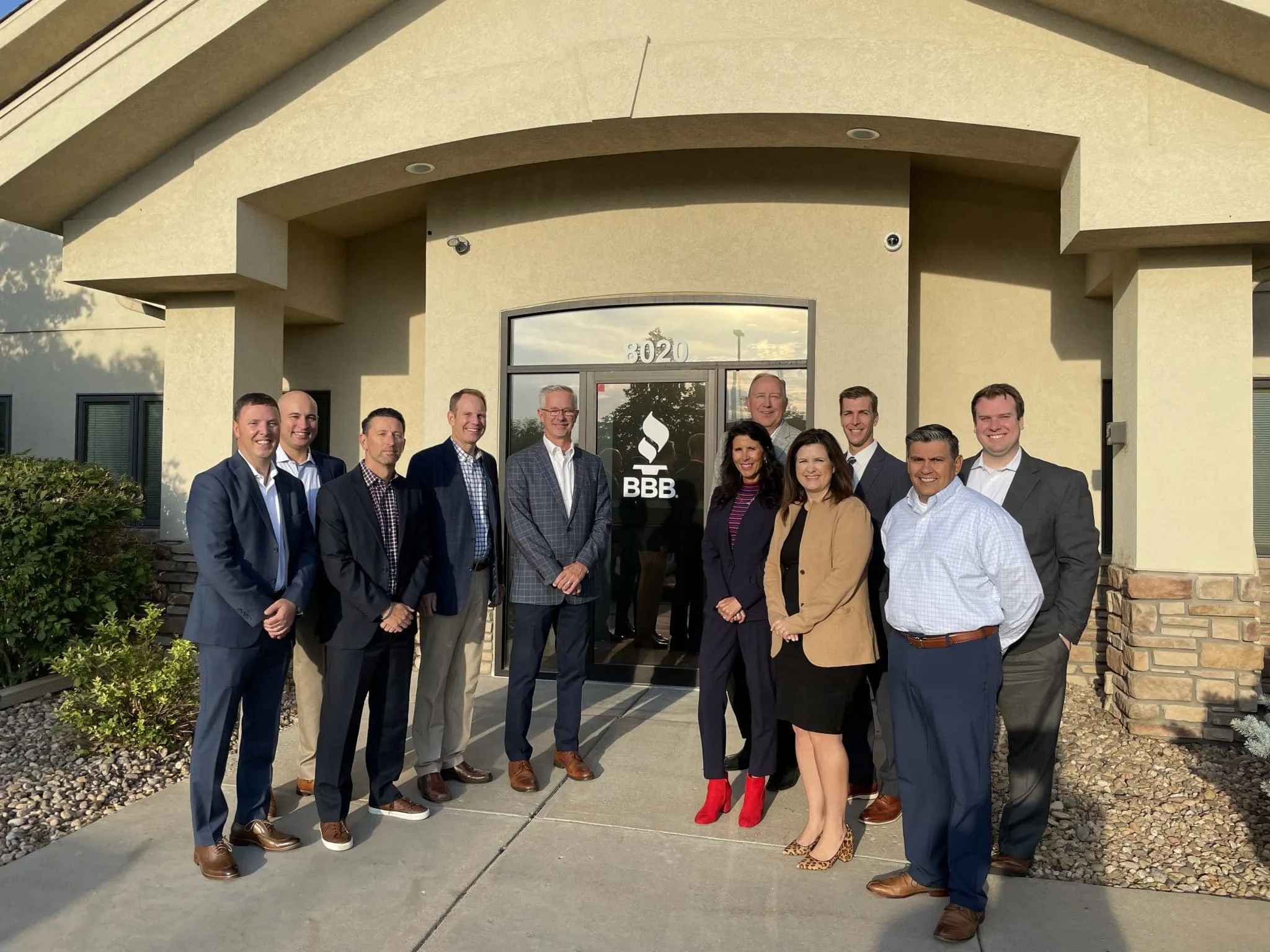Workforce among top concerns for region’s bankers

WINDSOR — Lack of available workers ranked as one of the biggest concerns for Northern Colorado bankers joining BizWest’s CEO Roundtable on Banking, Tuesday, with the issue affecting not only their clients but the banks themselves.
Participants also highlighted consumer banking habits, the role of banks in helping businesses take advantage of the Paycheck Protection Program, government regulation and concerns about the economy going forward.
The gathering took place at the BBB of Northern Colorado headquarters in Windsor.
SPONSORED CONTENT
John Berkhausen, president of commercial banking for Adams Bank & Trust, said “availability of workforce” is a primary concern. The point was echoed by Chris Chippindale, senior vice president for Northern operations at Ent Credit Union.
Shawn Osthoff, president of Bank of Colorado, said his hospitality and food service clients were still having trouble hiring people “to serve, to cook, to run the restaurant,” and these jobs of course cannot happen from home — even if that’s a good idea.”
Michele Bolkovatz, vice president of public relations at Blue Federal Credit Union, noted that employees are engaging in “self-reflection, thinking through what’s important: Is it working 15 hours a day or taking less of a job and doing what’s important to me.”
This applies to both clients and the financial institutions themselves.
“Happy employees make happy [credit union] members,” Bolkavatz said, noting that Blue had advertised for a corporate role and “we received one application.”
Some, she said, “don’t want to work, and those who are working have good jobs.”
Some of those jobs also can be done remotely, with Fort Collins and Boulder recently making a Top 20 list of the most-desirable remote work locations in the U.S.
Berkhausen said “demand for labor is higher than the unemployment rate.”
Although some argue that removing federal enhanced unemployment benefits, “hasn’t changed employment,” he said, he had “talked to three business owners yesterday who are hiring, now that the benefits have expired,” and even resume gaps didn’t slow those companies down.
Bryan Guest, Northern Colorado group president for Great Western Bank, said adequate pay and benefits are critical in retention, especially in an industry such as banking where competition for labor is high
“I have employees in Arizona who work for us in Northern Colorado,” he said. “How do we pay adequately so as not to lose them to someone else in this room?” he asked.
One trend of the pandemic has been the rise of remote work, but that’s not a viable long-term strategy for banks or their clients, Chippindale said.
“Distance will stifle creativity,” he said, and “you need to bring people together. We can be productive at home, but that’s not telling the whole story.”
Osthoff noted that productivity is a big concern with a remote workforce.
“Some companies have tried a remote workforce but are seeing it’s not as productive,” he said. “Small businesses will have people back in; for larger offices, it’s more of a concern.”
Consumer habits
The COVID-19 pandemic also has accelerated changes in consumer banking, such as promoting mobile banking.
“We’ve effectively kicked our customers out of the bank for the last year and a half, said Mark Brase, president of Points West Community Bank.
And they’ve gotten used to it, others agreed.
“Lock your branches and don’t let anybody in, and customers learn how to bank differently,” Guest said. “We don’t ever have to step in the bank to get something” again.
PNC Bank’s Colorado regional president Ryan Beiser said digital transactions traditionally increased by about 1% a quarter before 2020. Post-COVID, “we accelerated five years on that percentage,” he said.
The flip side of this wasn’t bad.
“Mobile deposits went up considerably,” said Charlie Pepin, commercial banking manager for First National Bank of Omaha, which operates as FNBO. “In the summer, we didn’t see that decline.”
But there are times customers want to come in, personally, to a physical location and speak directly to another live human being or if there’s a problem, participants said.
Beiser said, “brick and mortar is still important: When you have an issue, you have to find someone.”
He added in a follow-up email that PNC entered the state with a focus on digital. But “while two-thirds of our customers use non-branch channels … they still want to know there’s a branch nearby” when they need to talk, often about something that is going wrong.
PNC calls them “solution centers” and in addition to answering just-want-to-know type questions — and at tougher times, pressing concerns — they also ironically and interestingly enough provide “one-on-one demonstrations of PNC’s digital banking” options.
The question is, Guest said, “How do we do business differently?”
Brase said, “Now it’s back to community banking.”
Economic recovery
Roundtable participants noted the key role that banks played in fostering economic recovery, including helping clients navigate the federal Paycheck Protection Program. The program boosted bottom lines during the pandemic and continues to help.
Osthoff said “it was rewarding to be able to go in and help” people and that the program particularly was a boon to hospitality and restaurant borrowers.
Nicole Staudinger, Northern Colorado president at First Bank, said the program contributed to “record loan volume, getting funds out the door. Clients saw expansion opportunities [and] interest rates were low.”
Brase noted that Points West PPP loan volume drove positive results for the bank.
Banks and credit unions also played a key role in relief programs, with Bolkovatz noting that Blue Federal Credit Union organized a $500,000 fund to help struggling nonprofits. Some clients even donated personal stimulus checks to the program, she noted.
“The community itself did this,” she said.
Osthoff said that while the pandemic has been costly for many businesses, others are coming back stronger.
“We hate that we’ve lost businesses in the pandemic but those who survived are coming back stronger,” Osthoff said.
As to banks, he said, “we’re all very liquid, low loan-to-deposit, all in the same boat, chasing the yield. If you’re paying anything on a deposit, it’s too much.”
Loans didn’t go as bad as was thought at the beginning of the lockdowns, and banks “have the best credit quality we ever have,” he said.
Staudinger noted the strength in the real estate market, including both commercial and residential properties. That’s helped to ease concerns about potential problems when federal moratoria on certain residential foreclosures expire.
“We’re not seeing delinquencies, either,” she said. Home values are positive “and there’s so much liquidity in the market looking for places to invest.”
Home owners who might get into trouble on their mortgages have numerous options other than foreclosure, she noted.
Although commercial real estate sectors such as industrial and warehouse/distribution remain strong, questions exist about some other sectors. Remote work trends raise questions about the future of the office market, and certain retail has struggled during the pandemic.
Regulatory concerns
Bankers expressed concern about new federal regulations on financial institutions, including potentially changing reporting requirements.
Osthoff mentioned “Section 1071” of Dodd-Frank — the Dodd-Frank Wall Street Reform and Consumer Protection Act of 2010. The section amended 1974’s Equal Credit Opportunity Act to require institutions to collect and report new data on clients.
Final rules now being written on this matter could result in “requiring banks to report substantial information on small business and individuals,” Osthoff said.
A critical period
Participants said the next 60 to 90 days are key for the economy, including unemployment, inflation, supply chains and the direction of federal support if the economy goes awry.
Pepin said, “there’s a big ‘but’ there in regard to what’s coming. It could change fast. Is government going to be there to help?”
Sponsor attendees of the CEO Roundtable included Owen Ronk, Plante Moran; Darin Atteberry, Elevations Credit Union; and Ashley Cawthorn, Berg Hill Greenleaf Ruscitti LLP.
WINDSOR — Lack of available workers ranked as one of the biggest concerns for Northern Colorado bankers joining BizWest’s CEO Roundtable on Banking, Tuesday, with the issue affecting not only their clients but the banks themselves.
Participants also highlighted consumer banking habits, the role of banks in helping businesses take advantage of the Paycheck Protection Program, government regulation and concerns about the economy going forward.
The gathering took place at the BBB of Northern Colorado headquarters in Windsor.
John Berkhausen, president of commercial banking for Adams Bank & Trust, said “availability of workforce” is a primary concern. The point was echoed by Chris…




